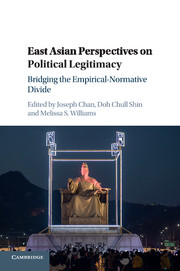Book contents
- Frontmatter
- Contents
- List of Contributors
- Preface and Acknowledgments
- 1 Political Legitimacy in East Asia: Bridging Normative and Empirical Analysis
- 2 Reasons to Obey: “Multiple Modernities” and Constructions of Political Legitimacy
- 3 Do East Asian States Enjoy a Legitimacy Premium?
- 4 Political Legitimacy in China: A Confucian Approach
- 5 Political Legitimacy in Hong Kong: A Hybrid Notion
- 6 The Evolution of Political Legitimacy in Singapore: Electoral Institutions, Governmental Performance, Moral Authority, and Meritocracy
- 7 Polarized Politics, Government Legitimacy, and Democratic Legitimacy in Taiwan
- 8 The Legitimacy of Democratic Rule in Korea: From the Perspective of the Mass Citizenry
- 9 Political Legitimacy, Satisfaction, and Japanese Democracy
- 10 Legitimacy as a Hybrid Phenomenon
- Index
6 - The Evolution of Political Legitimacy in Singapore: Electoral Institutions, Governmental Performance, Moral Authority, and Meritocracy
Published online by Cambridge University Press: 30 December 2016
- Frontmatter
- Contents
- List of Contributors
- Preface and Acknowledgments
- 1 Political Legitimacy in East Asia: Bridging Normative and Empirical Analysis
- 2 Reasons to Obey: “Multiple Modernities” and Constructions of Political Legitimacy
- 3 Do East Asian States Enjoy a Legitimacy Premium?
- 4 Political Legitimacy in China: A Confucian Approach
- 5 Political Legitimacy in Hong Kong: A Hybrid Notion
- 6 The Evolution of Political Legitimacy in Singapore: Electoral Institutions, Governmental Performance, Moral Authority, and Meritocracy
- 7 Polarized Politics, Government Legitimacy, and Democratic Legitimacy in Taiwan
- 8 The Legitimacy of Democratic Rule in Korea: From the Perspective of the Mass Citizenry
- 9 Political Legitimacy, Satisfaction, and Japanese Democracy
- 10 Legitimacy as a Hybrid Phenomenon
- Index
Summary
The People's Action Party (PAP) has been at the helm of a one-party dominant state since Singapore became independent in 1965. From 1966 to 1981, PAP members of parliament (MPs) occupied every seat in Singapore's Westminster-style parliament. As a founding member of the PAP and the country's first prime minister (PM), Lee Kuan Yew presided over the transformation of the country from Third World to First World status. Goh Chok Tong (PM from 1990 to 2004) and Lee Hsien Loong (PM from 2004 to the present) built on that foundation to turn the small island nation into an economic powerhouse. Each of them is rightly proud of his government's contribution to the many and continuing achievements of the nation. Singapore's leaders have always been deeply convinced of their strong mandate to govern and their right to be obeyed, especially when they had to make unpopular decisions that they considered to be necessary.
However, in general elections held on May 7, 2011, the PAP garnered only 60.14 percent of the total votes and won 81 out of 87 seats. The PAP's five-member team fielded in the Aljunied Group Representation Constituency (GRC) was beaten by the Workers’ Party team, the first time that any of these team-contested multi-seat GRCs ever went to the opposition. The PAP's Aljunied team included Foreign Affairs Minister George Yeo and Singapore's first female cabinet minister Lim Hwee Hua. Widely held to be a watershed event, the election was atypical. Compared to past elections, it saw the largest number of seats contested and, in connection with this, the largest number of Singaporeans – up to 2.06 million – casting their votes, many for the very first time.
Just three months later, Singaporeans voted again in presidential elections held on August 27. Though required to be nonpartisan, three presidential candidates were previously PAP members and one had been a member of the opposition Singapore Democratic Party. Tony Tan, former deputy prime minister and PAP chairman as well as the government's preferred candidate, won 35.2 percent of the votes and was announced as president. He beat his closest rival Tan Cheng Bock by a narrow margin. The outspoken former PAP backbencher won 34.8 percent of the votes.
- Type
- Chapter
- Information
- East Asian Perspectives on Political LegitimacyBridging the Empirical-Normative Divide, pp. 135 - 165Publisher: Cambridge University PressPrint publication year: 2016
- 1
- Cited by



